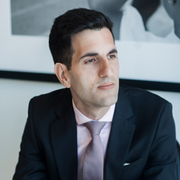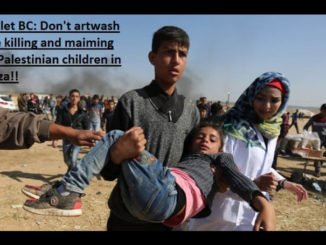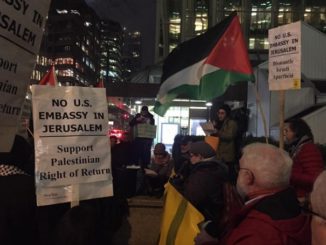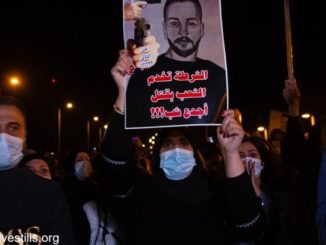
New Zealand reminds me of Canada. And I regret I don’t mean that as a compliment.
The two countries have a dearth of Palestinian voices in mainstream media. I started thinking more of this unadmirable similarity, this past Nakba Day (May 15). The date recalls the 1948 expulsion of hundreds of thousands of Palestinians from their homes, to establish the state of Israel. It was also around this time I received a press release from Palestinian Solidarity Network Aotearoa, a New Zealand organization, that states:
“Nakba, Arabic for “catastrophe.” This is a hugely important day for Palestinians and Palestinian New Zealanders and yet it rarely receives any acknowledgment from the mainstream media [in New Zealand].
To mark this day, we are encouraging mainstream media to report on the experience of Palestinian New Zealanders and their families in relation to the Nakba.”
I admit that I was a little surprised to read this. New Zealand, as is well-known, has a reputation for being a democratic and progressive country. As Ewan McDonald observes, in a BBC article on the topic:
“[New Zealand] lays claim to a number of social and political advances: creating indigenous parliamentary seats (1857); granting women the vote (1893); advocating an eight-hour working day (1840); state-funded old-age pensions (1898); the world’s most extensive system of pensions and welfare (1938); and its unique no-fault accident compensation scheme (1974).
From 1890 to 1920, New Zealand was regarded by foreign observers as a “social laboratory” due to its progressive policy initiatives, and [current New Zealand Prime Minister Jacinda] Ardern’s determination to measure national progress in ‘wellbeing’ targets – raising income, improving environmental and social good – has been characterized as a return to that aspiration.”
How is it that New Zealand, like Canada, has such an impressive social justice dimension while virtually absent entirely from mainstream media is the lived experience of Palestinians? After all, they are survivors of one of the world’s most violent, hateful and racist regimes: Israel.
Whatever the reason it means that neither Canada nor New Zealand can ultimately trusted to uphold human rights. Those who are selective about when and whose such rights to uphold are phony. Opportunists. They will only “uphold” human rights when it has some (calculable) benefit for them. For example, a mainstream newspaper that excludes Palestinian voices while championing a whole host of other progressive causes (ones that are no doubt important) such as women’s autonomy, anti-racism and religious freedom, does so to gain favor among audiences concerned about social justice or advertisers who want to appear “cool” among such audiences (liberal, affluent, educated, etc.).
American President Joe Biden is doing similar by expressing concern and dismay for the racist massacre in Buffalo last Saturday while funding a Palestinian genocide; he provides Israel with upwards of three billion in military aid to that end.
Opportunists of this sort will not expose the plight of all oppressed peoples. Palestinians don’t matter to them such that they don’t make it ever a priority to foreground their voices. Should they, the truth of the brutal Israeli occupation is brought into being, public consciousness. What people would thereby learn would upset them, possibly mobilize them—taking collective action to fight against both Israeli oppression of the Palestinian people themselves and the lies (as perpetrated by the Israeli lobby) that sustain, such as reducing Palestinian suffering to “poor Arab leadership.”
Most Canadians I talked to don’t know about the Nakba. Some even don’t know about Palestine. It is not entirely their fault. Canadians, perhaps like New Zealanders, are brought up in a school system that gives no substantive account of Israeli-Palestinian relations. On top of that the mainstream media constantly frames such relations as fraught with “war” and “conflict” rather than as being one entity (Israel) colonizing another (Palestine)—ever since the Nakba.
What would directly challenge this are Palestinian voices, especially those who experienced the Nakba firsthand, to describe the trauma and horror it inflicted on the Palestinian people, the attendant theft of Palestinian land from Zionist terrorists but grades, the massacre and dispossession of entire Palestinian village populations by the same depraved forces.
People deserve to know this because we are supposed to be caring for one another; that’s what it is to be human. And without knowing fully what has happened to the Palestinian people will fail to appreciate the extent to which they, internationally, are called to engage in actual struggle for Palestinian justice. To push back against the evil of Israel—a heartless colonial power intent on extinguishing Palestine.
Political leaders in Canada and New Zealand who continue to deliberately avoid acknowledging this while praising Israel as a “democracy” or successful “start-up nation” not only lie. They silently show contempt for the public, manipulated to go along with the narrative of imperial power rather than factual or material history. So long as that is hidden Israel can continue the ethnic cleansing of Palestine with relative ease. The international community, on the other hand, springs into greater action the more such a criminal campaign is brought to light, surfaces as a feature of regular discussion in mainstream media.
I asked John Minto, National Chair of Palestine Solidarity Network Aotearoa, about how Palestinian activism is regarded by political power in New Zealand.
His reply cut to the chase: “an irritation.”
Mintos’ reply recalls Socrates. Like the ancient Greek philosopher, the Palestinian activist is a gadfly. They keep contesting political power, be it in New Zealand or Canada, and holding it to task for siding with Israel. This, of course to their discomfort, reminds them that right thing to do—on moral and legal grounds—is to side with Palestine. Never giving this more than a passing thought, however, they don’t. They instead prefer to cite “practical” reasons, such as maintaining free trade and a strategic position in the Middle East, as to why they remain cozy with Israel. Far from benign this further facilitates the murder, dispossession and arbitrary incarceration of Palestinians, increasing the unnecessary harm and suffering in the world. Meanwhile those advocating the non-violent end to this, such as by way of BDS, are punished by political power—smeared, intimidated, forced to resign, apologize, etc. It’s absurd.
Still, like Socrates and wherever we are geographically we cave into the fear, resign in our international efforts—arguably stronger than ever before—to dismantle the present Israeli state. To do so is to wrongly give up on the Palestinian people who have both a right to a future and to everything that’s been stolen from them.
Worse than being a nuisance, this is cowardice. Palestine deserves our utmost courage.

– Paul Salvatori is a Toronto-based journalist, community worker and artist. Much of his work on Palestine involves public education, such as through his recently created interview series, “Palestine in Perspective” (The Dark Room Podcast), where he speaks with writers, scholars and activists. He contributed this article to The Palestine Chronicle.








